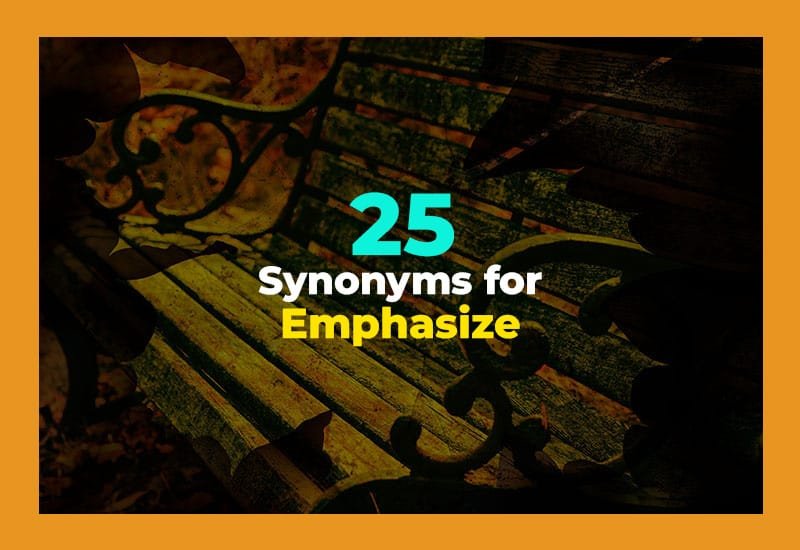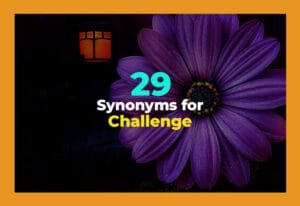Have you ever wanted to make your point stand out but didn't want to keep saying "emphasize"? In this article, we'll explore 25 great synonyms for "emphasize" like "highlight," "underline," and "stress." Each one adds its own tone and flavor depending on what you want to say or write.
1. Highlight
"Highlight" is one of the most common ways to say "emphasize." It means drawing attention to something important so others can easily notice it. This word is great in both writing and speaking when you want to focus on key details or features. Professionals, teachers, and writers often use "highlight" to point out the main ideas in a discussion or report. It feels friendly and easy to understand, making it perfect for any context.
- She highlighted the most important points in her presentation.
- The teacher highlighted key vocabulary in the lesson.
- I want to highlight the main reason behind our success.
2. Stress
"Stress" means to give special importance or weight to something. It's often used when you want people to understand that a specific point matters a lot. You can use it in both formal and casual settings. Managers, educators, and leaders often stress key rules or ideas so that no one misses them. It's a good choice when you want to sound confident and serious.
- He stressed the need for teamwork in every project.
- The doctor stressed how important regular exercise is.
- I can't stress enough how crucial this deadline is.
3. Underline
"Underline" works well when you want to draw a figurative or literal line under something to show its importance. It's a nice visual word that reminds people of written notes or documents. This term is often used by writers, editors, or speakers who want to make their ideas stand out. It helps listeners or readers remember what truly matters.
- The manager underlined the importance of punctuality.
- The speaker underlined the key benefits of the new system.
- She underlined how passion drives creativity.
4. Point Out
"Point out" is casual and conversational. It's used when you want to bring attention to a specific fact or idea. Teachers, parents, and coworkers often use it in everyday talks to make sure someone notices something. It's friendly and useful for both speaking and writing when you want to sound approachable and clear.
- I'd like to point out a small mistake in your report.
- She pointed out that the meeting starts earlier today.
- The guide pointed out famous landmarks during the tour.
5. Bring Out
"Bring out" means to show something clearly or make it more noticeable. It's often used when discussing qualities, feelings, or features. Artists, designers, and marketers love this phrase because it gives a sense of revealing or showcasing. You can use it when you want to make something stand out naturally without sounding too formal.
- The new design brings out the product's best features.
- His speech brought out the team's shared goals.
- This color brings out the warmth of the room.
6. Accent
"Accent" adds a nice touch of sophistication. It means to give emphasis or extra importance to a specific part of something, often in style, tone, or speech. People use it when they want to highlight a feature but in a subtle way. It's popular in fashion, art, and communication because it sounds refined.
- The curtains accent the beauty of the living room.
- Her tone accented the importance of honesty.
- The design accents the company's modern image.
7. Spotlight
"Spotlight" brings the image of shining a bright light on something important. It's often used in both literal and figurative ways. You can use it when you want to give special attention to a person, idea, or issue. Journalists, leaders, and event hosts often use it to make something or someone stand out.
- The event spotlighted local community heroes.
- His book spotlights real-world environmental issues.
- The documentary spotlights women making history.
8. Reinforce
"Reinforce" means to make something stronger or more certain. It's perfect when you want to support an idea or belief so it becomes more convincing. Teachers, leaders, and writers often use it to back up a message. It gives a feeling of strength and reliability.
- The data reinforces our earlier findings.
- Her story reinforces the power of perseverance.
- Training sessions reinforce what employees learn.
9. Reiterate
"Reiterate" means to repeat something for clarity or importance. It's often used when you've already said something but want to make sure it's remembered. Professionals, speakers, and teachers use it to ensure a key point sticks. It sounds polite and firm, perfect for formal or business use.
- I'd like to reiterate our main goals for this project.
- The teacher reiterated the instructions before the exam.
- He reiterated the importance of safety precautions.
10. Focus On
"Focus on" means to direct your attention or energy toward something specific. It's used in all kinds of settings—from work to daily life. It helps make your message clear and organized. Students, workers, and leaders use it when they want to guide others toward what truly matters.
- Let's focus on improving customer service.
- She focused on her strengths during the interview.
- The article focuses on climate change solutions.
11. Draw Attention To
"Draw attention to" means to make people notice something. It's often used when you want to bring awareness to an issue or highlight a detail. It works great in marketing, journalism, or social awareness campaigns. It's friendly but still professional.
- The ad draws attention to the brand's new features.
- The report draws attention to growing pollution levels.
- Her speech drew attention to mental health awareness.
12. Make Clear
"Make clear" means to help others understand something completely. It's often used by teachers, leaders, or writers who want to ensure their audience doesn't misunderstand them. It's straightforward and direct. Use it when you want your message to be understood easily.
- Let me make clear what this project requires.
- The manager made clear that deadlines must be met.
- He made clear his reasons for the decision.
13. Show
"Show" is a very flexible synonym. It means to demonstrate or display something for others to see or understand. It's useful in almost any situation, from daily talk to professional writing. It's especially great when you want your actions or facts to do the talking.
- The results show a positive trend.
- Her face showed how happy she was.
- The data shows our progress this year.
14. Illustrate
"Illustrate" means to explain or make something clear using examples or images. It's common in teaching, writing, and speaking. When you use it, your point becomes easier to understand because it adds a visual or relatable touch.
- The chart illustrates the company's growth.
- Her story illustrates why honesty matters.
- This example illustrates the main problem.
15. Stress Upon
"Stress upon" is a slightly formal phrase meaning to place strong importance on something. It's great for professional or academic settings. Teachers, leaders, and writers often use it when they want to sound confident and instructive.
- He stressed upon the value of hard work.
- The report stressed upon timely decision-making.
- She stressed upon teamwork during the meeting.
16. Bring Attention To
"Bring attention to" means to help others notice something that might otherwise go unseen. It's often used in speeches, campaigns, or reports. It's useful when you want to highlight an issue or achievement in a thoughtful way.
- The campaign brings attention to hunger relief.
- Her video brings attention to online safety.
- This project brings attention to local artists.
17. Call Attention To
"Call attention to" is similar to "bring attention to," but it sounds a bit stronger. It's often used when someone wants to make others notice a serious or important matter. It's great for both writing and speech.
- The study calls attention to rising costs.
- She called attention to unfair treatment.
- The article calls attention to climate issues.
18. Mark
"Mark" means to notice or show something significant. It's often used when identifying milestones or differences. Writers, historians, and professionals use it to point out moments or features that stand out.
- This year marks our company's tenth anniversary.
- His speech marks a turning point in policy.
- The event marks the start of a new era.
19. Indicate
"Indicate" means to show or suggest something indirectly. It's great for formal or factual writing. Researchers, analysts, and teachers often use it when presenting evidence or data.
- The results indicate strong customer satisfaction.
- Her tone indicated she wasn't happy.
- The study indicates a need for improvement.
20. Focus Attention On
"Focus attention on" means to make people concentrate on something specific. It's ideal when you want to guide others to see what matters most. Speakers, educators, and leaders often use it.
- The report focuses attention on employee well-being.
- The ad focuses attention on eco-friendly products.
- His talk focused attention on leadership skills.
21. Insist On
"Insist on" means to demand or strongly encourage something. It's useful when you want to sound firm and confident. Teachers, parents, and managers use it to stress important rules or expectations.
- She insisted on honesty in every deal.
- The coach insisted on daily practice.
- I insist on clear communication from everyone.
22. Give Priority To
"Give priority to" means to treat something as more important than others. It's used in planning, work, or decisions. It's great when you want to show focus and order.
- We should give priority to safety measures.
- The company gives priority to customer feedback.
- The teacher gave priority to struggling students.
23. Draw Focus To
"Draw focus to" means to guide someone's attention to a main idea or object. It's commonly used in art, design, and writing. It gives a gentle and thoughtful tone.
- The colors draw focus to the painting's center.
- Her introduction drew focus to the key issue.
- The headline draws focus to the main story.
24. Spotlight On
"Spotlight on" is often used when introducing or celebrating something or someone special. It has an exciting and positive feel. It's used in events, media, and stories.
- The show puts the spotlight on new talent.
- The article shines the spotlight on innovation.
- The interview spotlights a young entrepreneur.
25. Emphasize Again
"Emphasize again" means to repeat or restate something important to make sure everyone understands it. It's friendly and useful when reminding others. It's perfect for both formal and casual communication.
- I want to emphasize again how vital teamwork is.
- The teacher emphasized again the importance of attendance.
- Let's emphasize again the goal for this month.
| Synonym | Meaning | Example |
|---|---|---|
| Highlight | To draw attention to something important | She highlighted the key points. |
| Stress | To give special importance to something | He stressed the need for action. |
| Underline | To show importance or draw focus | The manager underlined the rule. |
| Point Out | To mention something to make it noticed | She pointed out a mistake. |
| Bring Out | To show clearly or make noticeable | The design brings out the details. |
| Accent | To add emphasis or importance | Her tone accented her point. |
| Spotlight | To give special attention | The show spotlighted local artists. |
| Reinforce | To make something stronger or clearer | Data reinforces the claim. |
| Reiterate | To repeat for clarity or importance | He reiterated the main goal. |
| Focus On | To direct attention toward something | Let's focus on improvement. |
| Draw Attention To | To make people notice something | The ad draws attention to safety. |
| Make Clear | To help others understand | He made clear his expectations. |
| Show | To display or make visible | The data shows great results. |
| Illustrate | To explain with examples | Her story illustrates the idea. |
| Stress Upon | To strongly emphasize | She stressed upon teamwork. |
| Bring Attention To | To make others aware of something | The event brings attention to charity. |
| Call Attention To | To draw focus or notice | He called attention to the issue. |
| Mark | To identify or show importance | This marks a big achievement. |
| Indicate | To show or suggest indirectly | Results indicate success. |
| Focus Attention On | To direct people's focus | The report focuses attention on growth. |
| Insist On | To demand or strongly require | She insisted on honesty. |
| Give Priority To | To treat as more important | We give priority to safety. |
| Draw Focus To | To guide attention toward something | The layout draws focus to images. |
| Spotlight On | To showcase or feature | The article spotlights new ideas. |
| Emphasize Again | To restate importance | I want to emphasize again our goals. |

Final Thoughts
Using different words for "emphasize" keeps your writing and speaking lively. Each synonym has its own strength and tone. Choose the one that fits your message best and makes your ideas stand out naturally every time.









